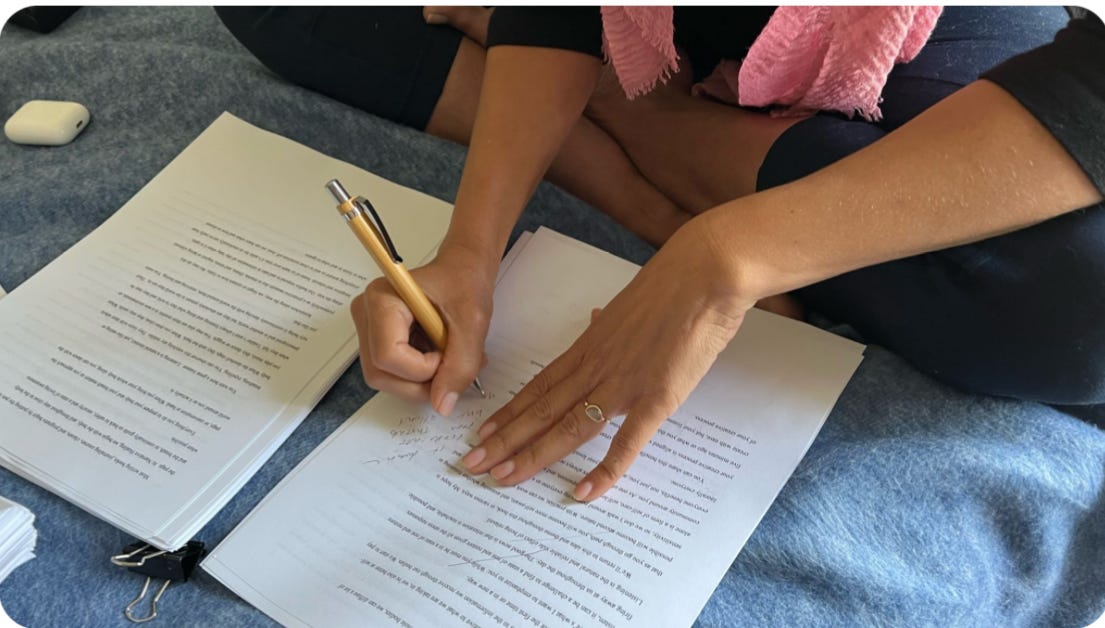Welcoming the Disruptions: A New Approach to Rest in Our Writing Lives
Rest, Disruption, and the Writing Life
One of the best things I’ve ever heard about writing and meditation comes from a story about American Poet Allen Ginsberg, a leading figure of the Beat Generation, best known for his poetry collection Howl (1956). He was a dedicated student of Tibetan meditation master Chögyam Trungpa Rinpoche and was fascinated by mindfulness. Over time, Ginsberg became so engrossed in the spacious practice of meditation that he began experiencing bursts of inspiration during his sessions. Fearing he might lose these flashes of brilliance, he began bringing a notebook to his mat to jot down ideas whenever they struck.
One day, Rinpoche noticed this and is famously said to have told him: “Allen, maybe you should just sit.” He reminded him that when he was writing, he was not meditating. He also reassured him that he would not lose his precious thoughts, the good ones would return to him.
This story reminds us that we can’t skip the pause. We often try to make mindfulness “productive,” hoping it will lead directly to better writing, clearer ideas, or better feelings. However, true inspiration can only arise when we create space—when we sit with ourselves, however uncomfortable that may be. A dear writer friend of mine summed it up with, “You can’t skip pause and write. You need to pause with the pause.”
It sounds so simple, but it’s not. Our busy minds want us to skip ahead to the work at hand, cling to the thought, and meet a deadline, emotion, or distraction, whatever it may be. However, we won’t experience the benefits of meditation if we don’t meditate — we cannot truly experience this inspiration without spaciousness. By the way, meditation also has many other benefits, including emotional balance and inner and outer connection. It's been proven to lower blood pressure and help with many mental health challenges and blocks, like anxiety and depression.
Luckily, there are many ways to practice meditation, including on the mat, off the mat, walking, mindful moving, and also writing itself, which can be a form of meditation when approached through a mindfulness lens.
So why do we avoid sitting with ourselves even though we deeply desire the benefits of stillness? It’s very uncomfortable! Relaxation often isn’t easy or pleasurable, especially when we’re living consciously. It requires us to face what is—and what is? Suffering, fear, boredom, anger, heartache, loss, and so much more...
We want to skip this, but we’ll never find our authentic voice and uncover the truth we need to share if we skip this step.
In the month of January, I’ll be sharing various restorative practices that prime the body, mind, and spirit to actually approach writing itself as a form of meditation, both for free in my weekly substack and if you’d like to join us live, in my weekly live gatherings in the Narrative Healing Community on Fridays at noon eastern (live & recorded), learn more.
Even when I sat down to write this newsletter, I was constantly interrupted by thoughts about an upcoming school deadline, whether the dog needed a walk and a dental appointment I forgot to make, ad infinitum. At first, I tried to push those thoughts away, but they only got louder. Then, I took a breath, wrote down what the voice was saying—namely: your voice is not as important as your to-do list—and gave it space. I told myself, 'Lisa, how about if you just wrote right now, just for five minutes?' So, I did—again and again—until there were words on the page. To my surprise, once I did, the voice quieted down, and I was able to return to my writing with more clarity and calm.
Welcoming Obstacles, the First Step Towards Rest
As we step into this month’s theme of rest in our writing lives, it might seem counterintuitive to begin by talking about obstacles—those nagging thoughts, distractions, and irritations that disrupt our sense of calm. Yet, they are often the very things keeping us from truly experiencing rest.
We tend to view obstacles as enemies—something to fight, avoid, or shove aside in order to create space for creativity and flow. But what if the key to deeper rest isn’t found in resisting them but in welcoming them?
Think about the last time you sat down to write or meditate, only to be interrupted by an irritating thought, an unfinished task, or an anxious feeling. Maybe it was something like, I forgot to reply to that email, or What if my writing isn’t good enough? We often try to push these thoughts away, thinking that if we could just banish them, we’d finally find the peace and inspiration we’re seeking.
But what if, instead of pushing them away, we invited them in?
The Power of Embracing Disruption
Distractions, nagging thoughts, and inner irritations are often trying to tell us something. They might be revealing hidden fears, unmet needs, or unresolved tension that we carry with us throughout our day. These voices—annoying as they may be—often hold wisdom when we’re willing to listen.
I invite you to shine a light on those disruptive voices in today's prompt. Rather than rejecting them, get curious:
• Who are they? Give them a name, a personality, or even a face.
• What are they saying? Write down their words without judgment.
• Why are they there? What purpose might they be serving, even if it feels counterproductive?
• How are they benefiting you? Maybe they’re trying to keep you safe from failure, protect your time, or remind you of something important.
By acknowledging and celebrating these inner obstacles, we take away their power. They no longer need to clamor for attention because we’ve already given them a seat at the table. We’ve welcomed them and listened to them, and in doing so, we free ourselves from their grip.
Setting the Table for Your Inner Guests
There’s a metaphor I love: imagine your inner world as a banquet table. Each voice—whether it’s your inner critic, your anxious planner, or your restless dreamer—gets a place at the table. You don’t need to let any one voice dominate, but by inviting them all to sit down, you create a space where they can be heard without taking over.
This practice isn’t about indulging in every distraction. It’s about softening your resistance to them so they lose their disruptive power. When we fight these voices, they grow louder. When we welcome them, they often quiet down on their own.
Try This: A Prompt for Welcoming Disruptions:
Take a moment to reflect on what’s been interrupting your rest lately—whether in your writing, your creative process, or your daily life. What are the nagging thoughts or distractions that keep showing up?
Now, write them down. Imagine them as characters or guests arriving at your inner banquet. What do they look like? What do they want to say? How might they be trying to help you in their own imperfect way? Once you’ve acknowledged them, thank them for their presence, and see if they’re ready to take a rest alongside you.
Rest with What Is: The Paradox of True Rest
True rest, I’ve found, comes not from perfectly clearing our minds or eliminating all distractions but from learning to rest with what is present. It’s about making space for everything—the calm, the chaos, and everything in between.
So this week, as you explore rest in your writing life, remember: you don’t need to push anything away. Invite it in. Let it sit beside you as you write, pause, and breathe. Trust that by embracing it, you’ll find a deeper, more sustainable kind of rest—the kind that nurtures your creative spirit and allows it to flourish.
Here’s to welcoming the disruptions and finding rest in their company.
Happy writing,
Lisa
Join Us for a Live Writing Session:
If this post resonates with you, I invite you to experience the power of pausing in real-time. Join me this Friday at noon Eastern for a live writing session where we’ll create space for rest, reflection, and inspiration. Together, we’ll explore how welcoming distractions can lead to deeper creative flow.
photo credit: Barry Sutton





